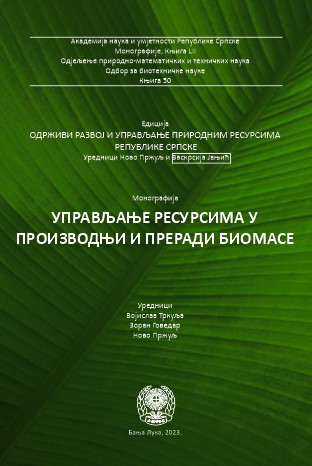Production and use of biomass from waste as part of a sustainable food supply chain
DOI:
https://doi.org/10.7251/EORU2306297GKeywords:
Food supply chain, waste, by-products, animal by-products, collection, utilization, technical processingAbstract
The world population is continuously growing and it affects increased usage of natural resources on one hand and creating waste and endangering natural environment on the other hand. According to FAO estimate in the following decades, the number of people on the earth is going to be increased to 10 billion, which requires increase in food production. The increase is going to lead to larger amount of waste, which is created in food supply chain. The term “food industry waste “covers all substances that represent left overs or unused excessive materials during production process. In fact, all materials that are meant to be disposed of or process them in a suitable way so they do not pollute environment can be considered the waste. The most part of waste from this sector are remains of basic raw materials, which are remains after obtaining main product. Taking into account these substances do not present the main product, they are known as by-products. They can be processed and reused. Non-disposed byproducts from agriculture and food industry pose a threat and endanger the health of people and animals. The interest in using by-products from food supply chain is growing constantly. Experts are looking for additional opportunities for their safe processing, ways for turning them into raw materials, by whose recycling into new products, the amount of the waste would be minimized, and at the same time new, usable products would be introduced. Large amounts of waste, including by-products is generated during production and processing of meat. If animal origin waste is not processed (recycled), it represent lost raw materials for production of protein energy food, technical grease for chemical industry or fuel with high calorific value. The most suitable way for harmless removal of non-edible by-products from meat industry as well as dead animals, is their collection and usage, depending on the structure and kind of raw materials and their categorization, technical processing and application of modern technologies. Disposal of by-products and animal waste in Republika Srpska is not resolved in an appropriate manner and poses a danger to human health and the health ofanimals. In order to achieve this, there is a need for organized collection, storaging and disposal of animal by-products from slaughtering of animals by their technical processing in specialized plants. These plants allow us to produce high-quality animal feed or the raw material for biofuels production (biogas, biodiesel) with the complete protection of the environment. Economic side of this problem implies collection and safe disposal of huge quantities of biological materials that produce costs, which have to be incorporated in prices of the products. If waste of animal origin is not processed (recycled), they represent lost raw material that was possible to incorporate in production of proteinaceous – energetic feed, technical fat for chemical industry or fuels with high calorific value. The most suitability way for harmless removal of inedible by-products from the meat industry, as well as dead animals, is certainly their collection and use depending on the type and structure of raw materials and their categorization, by technical processing using modern equipment and technology.
